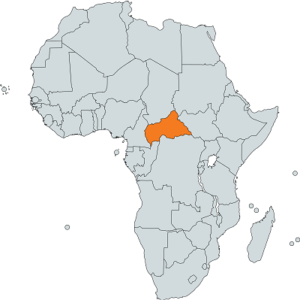Central African Republic
Background

The Central African Republic (CAR), a country that is often overlooked in the international arena, is located in the middle of the African continent. CAR sits at the crossroads of several other conflicts and has suffered a series of military coups and political unrest since independence from France in 1960. In 2016, the country ranked 188 out of 188 on the Human Development Index, despite the territory’s wealth, including diamonds, gold, timber, biodiversity, uranium, oil, and other resources coveted by international markets.
The modern era of crisis in CAR began in 2003, when Francois Bozizé seized power in a violent coup, with the support of Chad and France. After an electoral process that led to legitimization of Bozize’s power, opposition armed groups started to emerge in northern CAR in 2005 and over the next several years engaged in serious human rights violations and economic crimes. In December 2012, the Séléka – a coalition of armed groups – emerged out of this long struggle to overthrow Bozizé and eventually seized control of the country. For a period of 10 months in 2013, Séléka commanders, including Chadian and Sudanese mercenaries, pillaged the country’s economic resources. Security conditions in CAR further deteriorated when clashes erupted between the Séléka and groups of armed fighters that opposed ex-Séléka forces, called “anti-Balaka”.
Following international intervention and a transitional government, national elections were held in March 2016, leading Faustin-Archange Touadera, a former prime minister, to become president. Although there was some optimism following these elections, the situation throughout CAR as of March 2017 remained extremely volatile, with escalating attacks against civilians and humanitarian workers. More than 14 criminal groups effectively control the territory and intense rivalries exist for the control of the country’s wealth, leading to a de facto partition.
CAR ultimately needs a revived conflict-resolution effort and a peace process that tackles the root causes of violence and political unrest, especially the fight against impunity – prioritizing prosecutions and economic sanctions, political reforms that aim to improve governance at state level and the diversification of the economy, and the implementation of a comprehensive reconciliation plan among communities that prioritize political inclusion.

